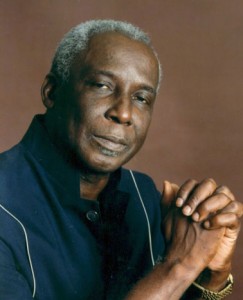The Jamaican academic, dancer, and choreographer Rex Nettleford — who died on Tuesday 2 February, a day before his 77th birthday — was a cultural and intellectual icon in his home country and across the Caribbean for four decades.
Nettleford died in Washington, DC, where he had travelled on university business. On 27 January, he suffered a major heart attack at his hotel, and was admitted to George Washington University Hospital. He never regained consciousness, and on 2 February, in accordance with his previously expressed wish, he was taken off life support.
Born in 1933 in the small town of Falmouth, on Jamaica's north coast, Ralston Milton Nettleford — best known by his nickname Rex — was a Rhodes Scholar, a founder of the celebrated Jamaica National Dance Theatre Company, a cultural advisor to three Jamaican prime ministers, and a member of faculty at the University of the West Indies, where he rose to the position of vice chancellor. His books included pioneering works in Caribbean cultural studies, notably Caribbean Cultural Identity (1978) and Inward Stretch, Outward Reach: A Voice from the Caribbean (1993).
In a statement made after Nettleford's death, Jamaican prime minister Bruce Golding called him “a quintessential Caribbean man”. The Jamaica Observer remarked in an editorial:
Jamaicans will remember him for his articulation of their craving to be “smady”, or “smaddification” – to be accepted as somebody with worth and character and not mere hewers of wood and carriers of water in the grand scheme of things.
Many Jamaicans online echoed these sentiments. The earliest reactions to news of Nettleford's death appeared on Facebook. Others took to Twitter to share their reactions. The Toronto-based Caribbean writer Nalo Hopkinson (@nalohopkinson) remarked: “R.I.P. Rex Nettleford. Thank you for being the loud, proud, beautiful genius you were.” Journalist Danyell McNish (@DanyellMcNish) asked: “what do you write in a tribute … except that the man was a GENIUS IN EVERY SENSE OF THE WORD?” Artist Oneika Russell (@oneikarussell) called him “Jamaica's foremost cultural ambassador”. And Annie Paul (@anniepaul) put it simply: “a great heart”.
Later, at her blog Active Voice, Paul wrote:
… the extraordinary thing about T Rex, as i privately thought of him, was that he was both an intellectual and a dancer at once, ingeniously harnessing mind and body.
She posted a long excerpt from an interview with Nettleford first published in 2006, covering his childhood and early education, and his thoughts on the role of the university in the contemporary Caribbean. Commenting on this post, Fragano Ledgister wrote:
He deserves to be remembered not just with our good thoughts, but with the sort of sound, engaged scholarship, cultural criticism, and artistic endeavour that were the work of his life.
At his blog, Miami-based Jamaican writer Geoffrey Philp added:
As a social critic, his insights have had a profound impact on the political and social development of Jamaica, and it should be remembered that Mr. Nettleford was one of the first to recognize the importance and impact of Rastafari in Jamaica and the Caribbean.
The National Gallery of Jamaica also paid tribute at its blog, with an excerpt from an important essay Nettleford wrote for a NGJ catalogue in 1979. And Caribbean Blog International reposted an article by Bahamian diplomat Ronald Sanders, who gave a sense of Nettleford's impact on the wider Caribbean region:
What everyone understands — those who knew him personally and those who didn’t — is that he was a Caribbean champion; a man who fervently believed in the worth of the term, “Caribbean person” and gave it both intellectual meaning and depiction….
Rex Nettleford simply made Caribbean people more assured of themselves; more comfortable in their skins of whatever colour; and more confident that, despite the fact that they are a transplanted people, they had established a unique cultural identity equal to any in the world.
Sanders added:
Nettleford was a dancer and choreographer – two disciplines he personally enjoyed and in which his creativity gave enjoyment to audiences throughout the Caribbean. In these disciplines, he danced to many drums and he was spectacular in his performance. But, it is in the dance to the drums of his Caribbean life that he is a motivating force – Jamaican he was by birth and commitment, but Caribbean he also was by intellectual understanding, cultural recognition, and passionate embrace.








1 comment
Do not stand at my grave and weep.
I am not there. I do not sleep
I am a thousand winds that swiftly blow.
I am the diamond glint on newly fallen snow.
I am the sunlight on ripened grain.
I am the soft and gentle autumn rain
When you wake from sleep in the early morning hush,
I am the swift, uplifting rush of quiet birds in circling flight.
I am the soft, starlight at night.
When you sit by river watching fish that cannot fly,
Weaving patterns round your feet as they go by
It’s me in my method of madness
As I dance like no one is looking
Do not stand at my grave and weep.
I am not there. I do not sleep.